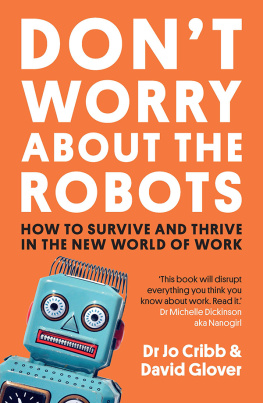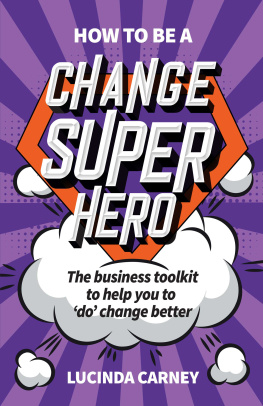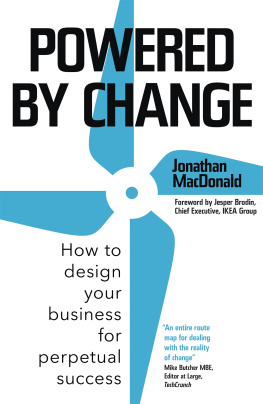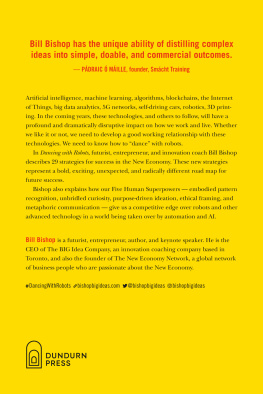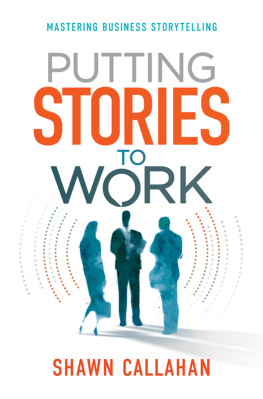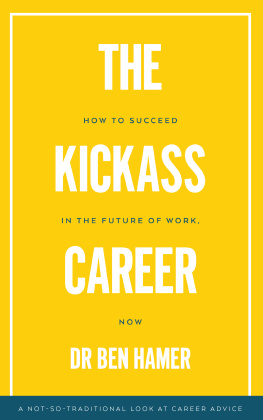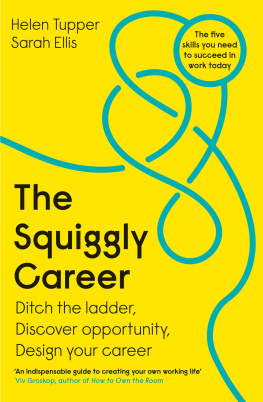First published in 2018
Copyright Jo Cribb and David Glover, 2018
All rights reserved. No part of this book may be reproduced or transmitted in any form or by any means, electronic or mechanical, including photocopying, recording or by any information storage and retrieval system, without prior permission in writing from the publisher.
Allen & Unwin
Level 3, 228 Queen Street
Auckland 1010, New Zealand
Phone: (64 9) 377 3800
Email:
Web: www.allenandunwin.co.nz
83 Alexander Street
Crows Nest NSW 2065, Australia
Phone: (61 2) 8425 0100
A catalogue record for this book is available from the National Library of New Zealand.
ISBN 978 1 76063 350 9
eBook ISBN 978 1 76063 637 1
Cover design: Kate Barraclough
Cover images by Josef Kubes (front) and Mauro Rodrigues (back), Shutterstock.com
To our life partners, Mike and Yvonne, for their loving support and patience, and our children, who are the future of work.
I am a great believer in luck. The harder I work, the more of it I seem to have.
COLEMAN COX
He mahi te ataa noho, e kii ana te wheke
It is the octopus who says sitting is working.
MORI PROVERB
Man who stands on a hill with mouth open will wait a long time for roast duck to drop in.
CONFUCIUS
CONTENTS

During the 50 years of my working life, I have seen many changes in the way we work, the way we communicate and the way we gather information. I am excited to see how David and Jo use interviews with smart people to challenge ideas about where we are going, and to give readers the opportunity to explore creative ways to determine their futures. The important message is that, though change is often difficult, it is only through accepting change and fresh approaches that you achieve results.
Today we live our lives linked with a much wider audience than in the past, via our phones and the internet, with the exchange of messages, news and information during every waking moment. How different life was when we had a mailing system, followed by the telex and later the fax machine. The working week ended on a Friday, and you got feedback on Monday. Manuscripts and artwork were sent via courier to a printer in Hong Kong. Now the files are sent via a computer network in seconds.
I recall when the company I was working for installed a fax machine. It occupied a special locked room in the New Zealand Newspaper Office. You had to get a key from the CEOs personal assistant to send a fax, and you had to justify your reason for sending it. In the early eighties I went overseas to visit our partners in the US. I convinced them that the fax was the future, and though they were unsure, they made the necessary investment of over $5000. Today faxes are museum pieces, as are CD-ROMsall this in the past few decades.
I recall when the company I was working for installed a fax machine. It occupied a special locked room in the New Zealand Newspaper Office. You had to get a key from the CEOs personal assistant to send a fax, and you had to justify your reason for sending it.
In the late nineties, I made the decision to create a print programme and simultaneously launch it on a digital platform with animation and extension activities. (At the time you dialled up to access digital content!) I wanted to develop a total reading programme in digital format and sell this to the world for $50. I had seen how PlayStations were having an impact and I imagined that the telcos would be enthusiastic about delivering this dream. After considerable investment, and with the help of clever New Zealand software designers and educationalists, I went out to the world to share this project. British Telecom said video would never play on the internet. Singtel in Singapore listened but did not understand. New Zealand Telecom gave me a cold cup of coffee.
The only player was Telstra in Australia, so together we launched a package for parents. This product became Sunshine Online, which is used by thousands of children every day, both web-based and as an app, and now preloaded on a tablet. Following the success of this experiment I also launched a learning programme for preschoolers that was delivered via cable by TimeWarner in the US.
The human connection is still important to achieve business success.
Today our web- and app-based literacy programmes track individual student progress and feed back vital information to teachers about the achievements of their students. This way of delivering learning is especially important for disadvantaged children and those struggling with the language of their adoptive country. Touch screens have meant this content is now easily used by small children. Tablets are in classrooms all over the world. Teachers use the internet for professional training and finding new and clever ways to direct classroom learning. Our challenge today in literacy education is to ensure that we make the most of the communication systems available to us without impacting negatively on the role of the good teacher.
The human connection is also still important to achieve business success. I do a great deal of negotiation via Skype and emails, but still there is a need to visit and talk person-to-person about a deal, particularly in the Asian markets. People still like to sit down together, as we all do as families, and talk about the deal and ways to work together over a good meal and good wine.
People around the world often ask me why, when I am in my seventies, I still work, developing ways to help children around the world learn to read. For me, when the sun comes up there is always a new idea and a new plan to work with and develop. I do hope the footprint I leave will have made a difference to the lives of many children. With over 300 million copies of our Sunshine Books, there is someone, somewhere, today reading a Sunshine story that is making a difference to their literacy learning and love of reading.
Dont be afraid of the future. If you have a dream, try it out. Make sure it is practical and works financially for you. I go out on the road and sell and sell again. Once I have found the right person to deal with, I share my dream with them and find out what their dream is. I am persistent. I never sell myself or my product short for short-term gain. I want an evergreen product that will last, but I am always open to new ideas that will improve it.
I am sure this book will provide inspiration for you, the reader, to develop new ways of thinking and achieve great enjoyment and success in whatever you choose to do. Good luck for your future.
Dame Wendy Pye DNZM, MBE
Exceptional Services to Entrepreneurship Award, 2017
Honorary Doctorate of Education (Massey University), 2018
Forty per cent of jobs to disappear in the next 20 years! Robots to replace humans! The end of the nine-to-five working day!
Every day we seem to read headlines that forecast a grim future for employment as we know it, amid speculation about which industries will be disrupted next. Commentators seize on expert opinion that claims we are facing a depressing readjustment in the size and nature of the global workforce, and that many of us will soon be past our use-by dates.
But whats really going on here and, just as importantly, what can we do about it? How can we prepare ourselves for the changes that will occur in the workforce in the coming years?
This project started with a conversation we had about work in early 2017. Jo had just left the safety of a high-flying career in the civil service. David was contemplating his next move after several years of running a business consultancy. We talked about the wide range of choices that young people face, and the conflicting messages they receive about their futures. We discussed what was happening to our friends and colleagues, and the impact of technology-driven changes that were rewriting the rules around jobs and sustainable careers. We both knew people who were being made redundant through continual restructuring, while others were choosing to leave the regular workforce to set up their own businesses or work across a number of roles. We knew people who were too scared to risk making any change, working long and unsustainable hours, in denial about what might happen to their jobs in the long term. We pondered the concept of career, and how the very idea of retirement was changing as people worked longer and in different ways.

